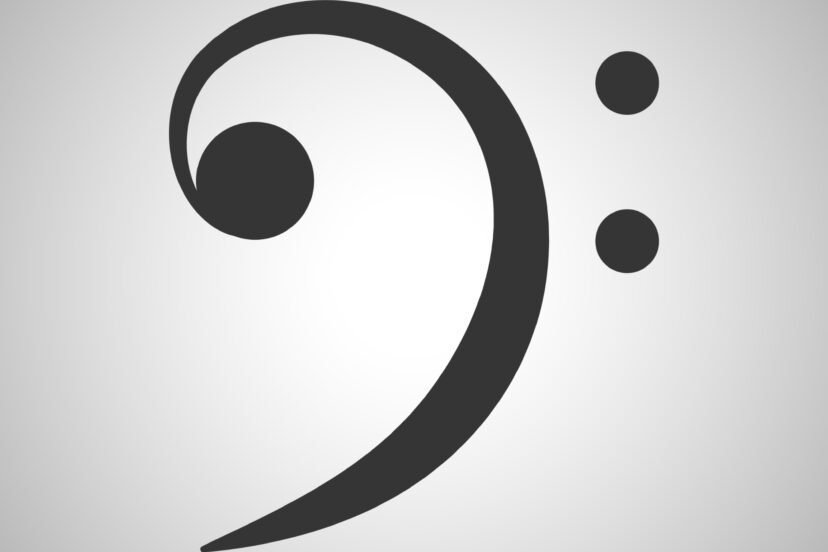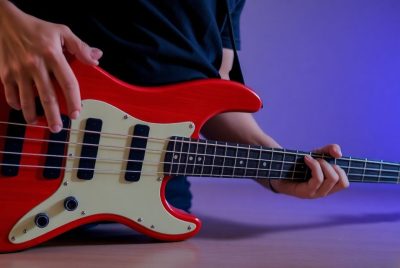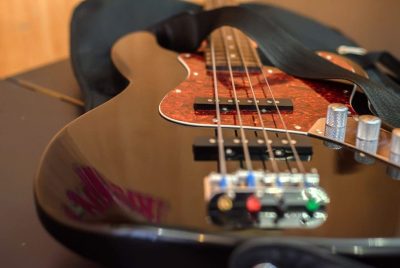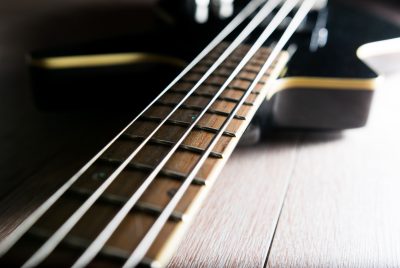Bass Octave Pedal: The Secret for a Powerful Bass Tone
You have enjoyed and maybe wondered how your favorite bassists get that mammoth sound? It’s time to let you in on a secret. As a fellow bass enthusiast, let’s dive into the magic world of the bass octave pedal.
What is a Bass Octave Pedal?
In simplest terms, an octave pedal is a stompbox that produces notes an octave higher or lower than the ones you’re playing. But, what does this mean for your sound?
The Role of an Octave Pedal
An octave pedal acts like your invisible bandmate, adding depth to your tone. It gives you the freedom to explore the soundscape, creating layers that make your bass lines stand out.
Why Use a Bass Octave Pedal?
A bass octave pedal is an essential tool for bassists looking to expand their sonic palette and add depth and texture to their music. This effect pedal generates tones that are one or more octaves lower or higher than the original note played, creating a fuller, richer sound. Here are some reasons why using a bass octave pedal can be beneficial:
- Enhanced Sound Texture: By adding lower octave notes to the original signal, bassists can produce a thick, powerful sound that adds a new dimension to both live performances and studio recordings.
- Versatility: An octave pedal allows bass players to mimic the sound of a synthesizer or double bass, making it a versatile tool for genres ranging from funk and soul to rock and electronic music.
- Harmonic Complexity: Using an octave pedal, bassists can enrich the harmonic content of their lines, adding complexity and interest to the music without overwhelming the mix.
- Solo Performance: For solo bassists or those in bands with minimal instrumentation, an octave pedal can fill out the sound, making the performance sound fuller and more dynamic.
- Creative Expression: The pedal offers an avenue for creative expression, allowing bassists to experiment with different textures and layers, leading to innovative bass lines and solos.
- Layering in Recordings: In the studio, an octave pedal can be used to layer bass tracks, creating a dense, impactful sound that enhances the overall production quality.
Overall, a bass octave pedal is a powerful tool for any bassist looking to push the boundaries of their instrument and explore new sonic territories, enriching their musical output with depth, versatility, and creativity.
Enhancing Solo Performance
When you’re the only bassist on stage, an octave pedal can give your solos a full, rich sound. Even in a band setting, an octave pedal helps to thicken your tone, lending it a powerful presence that cuts through the mix.
Anatomy of a Bass Octave Pedal
A bass octave pedal is a type of effects pedal designed specifically for bass guitars to produce octave effects, either by adding notes one or more octaves below or above the original note played. Here’s a breakdown of the typical anatomy and key features of a bass octave pedal:
- Input Jack: This is where you plug in the instrument cable from your bass guitar. It’s the starting point for the signal chain within the pedal.
- Output Jack: This jack sends the processed signal out from the pedal, either to an amplifier, another effects pedal, or directly to a recording interface.
- Octave Controls: These knobs or sliders adjust the level of the octave effect. Some pedals allow for separate control of one or more octaves below and/or above the original note, enabling you to blend the effect to your liking.
- Dry/Wet Mix: Many octave pedals feature a mix control that lets you balance the original (dry) signal with the effected (wet) signal. This determines how much of the octave effect is heard in relation to your bass’s natural sound.
- Footswitch: The foot-operated switch toggles the pedal on and off. When activated, the signal is processed through the octave effect; when bypassed, the signal passes through the pedal unaffected.
- LED Indicator: A light indicator that shows whether the pedal is active or in bypass mode. This visual cue is especially useful on dark stages.
- Power Supply Input: This port connects the pedal to a power source, which can be a battery, an AC adapter, or a pedalboard power supply, depending on the pedal’s design.
- Tone/EQ Control: Some advanced bass octave pedals include tone or EQ controls to shape the timbre of the octave effect, allowing for further customization of the sound.
- Octave Range Selector: Certain models offer a switch to select the range of the octave effect, such as one octave down, two octaves down, or an octave up, providing versatility in sound creation.
The anatomy of a bass octave pedal combines these components to create a tool that offers bass players a wide range of creative possibilities, from subtle enhancements to dramatic transformations of their sound.
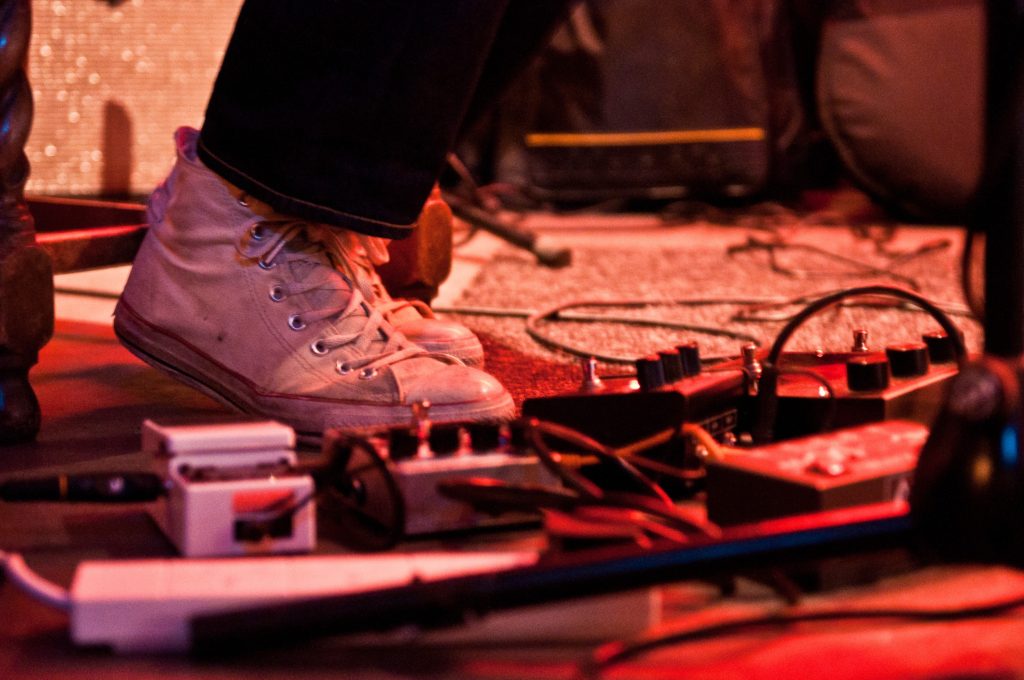
How to Choose the Best Bass Octave Pedal
Now, how do you pick the right bass octave pedal?
Analog vs. Digital
Analog and digital bass octave pedals are two distinct types of effects units designed to add octave sounds to the original bass signal, but they differ in their processing methods and the resulting tones.
Analog Bass Octave Pedals use analog circuitry to create the octave effect. The sound is generated through physical components like resistors, capacitors, and transistors. Analog octave pedals are known for their warm, natural sound and are often praised for their musical, slightly imperfect tracking, which can add character to the bass tone. They typically produce a strong sub-octave effect and may have a more limited range of octave options compared to digital pedals. Players seeking a vintage or classic octave sound with a simple, straightforward interface tend to prefer analog pedals.
Digital Bass Octave Pedals, on the other hand, utilize digital signal processing (DSP) to analyze the incoming bass signal and generate one or more octave effects. Digital pedals can offer a cleaner, more precise octave sound with fast and accurate tracking. They often provide a wider array of features, including the ability to add multiple octave intervals both above and below the original note, sometimes simultaneously. Digital octave pedals may also offer additional effects and more control over the sound, such as polyphonic tracking that allows complex chords to be processed cleanly.
Key Differences:
- Sound Quality: Analog pedals are celebrated for their warmth and organic feel, while digital pedals offer clarity and precision.
- Tracking: Digital pedals generally track the playing more accurately, especially with fast playing or complex polyphonic lines, whereas analog pedals might struggle but add a unique texture.
- Versatility: Digital pedals often provide more options for sound customization and may include additional effects beyond octave doubling.
- Ease of Use: Analog pedals usually have simpler interfaces, appealing to players who prefer plug-and-play solutions, whereas digital pedals might require more tweaking but offer greater flexibility.
Choosing between an analog and digital bass octave pedal depends on the player’s preference for sound character, the need for precise tracking, the desire for additional features, and the type of music being played.
Tracking Speed
This is how quickly the pedal recognizes and processes the note you play. Faster is usually better.
Budget
Always consider the price-performance ratio. Sometimes, less expensive pedals deliver comparable performance to high-end models.
Top 5 Bass Octave Pedals
Let me share with you my top picks based on personal experience and extensive research.
Pedal 1: Boss OC-3 Super Octave
The Boss OC-3 Super Octave takes the top spot on our list for its versatility and durability. This digital pedal offers both octave up and down effects, and its Polyphonic Octave mode allows for multi-note processing – a rarity in octave pedals.
Pedal 2: Electro-Harmonix POG2
The Electro-Harmonix POG2 is a beast when it comes to functionality. This pedal can handle multiple octaves both up and down and comes with a plethora of additional features like attack control and low pass filter. Despite its price, the POG2’s sheer versatility makes it a worthy investment.
Pedal 3: MXR M288 Bass Octave Deluxe
MXR’s M288 Bass Octave Deluxe is an analog pedal designed specifically for the bass. Its two independent octave voices and superior tracking make it a stand-out option for bassists seeking a warm, organic octave effect.
Pedal 4: Aguilar Octamizer
The Aguilar Octamizer offers a unique analog tone with a continuous blend knob, allowing for precise tonal shaping. It’s especially recommended for bassists who play funk or jazz, as it adds a warm vintage character to your tone.
Pedal 5: Digitech Whammy Bass Pitch Shift Pedal
Last but not least, the Digitech Whammy Bass Pitch Shift Pedal is an all-in-one unit with an array of harmonizing and detuning options, including octave up and down. Its true bypass wiring and MIDI input for remote control make it a great tool for live performances.
Tips to Get the Best Out of Your Octave Pedal
Remember to experiment. The right settings can vary greatly depending on your bass, amp, and the sound you’re aiming for. Also, consider the placement of your pedal in the effects chain and secured in a quality bass pedal board.. Typically, octave pedals perform best at the beginning of the chain.
Conclusion
The bass octave pedal is a versatile tool that can take your bass playing to new heights. It’s all about finding the right pedal for your style and mastering its use to enhance your sound. Keep experimenting, and you’ll soon discover a whole new world of bass tones.
FAQs
1. Do I need an octave pedal for my bass?
Not necessarily, but it can significantly enhance your sound, especially in solo performances or when you want to thicken your tone.
2. Can I use a guitar octave pedal for my bass?
While you can, a bass-specific octave pedal is designed to handle the low frequencies of a bass guitar, offering better performance.
3. Does an octave pedal change my playing style?
It doesn’t change your style, but it offers you more options to experiment with your tone.
4. Do I need special cables to connect my octave pedal?
Standard instrument cables will work perfectly fine.
5. How do I maintain my bass octave pedal?
Keep it clean, avoid extreme temperatures, and remove batteries when not in use to prolong your pedal’s lifespan.

